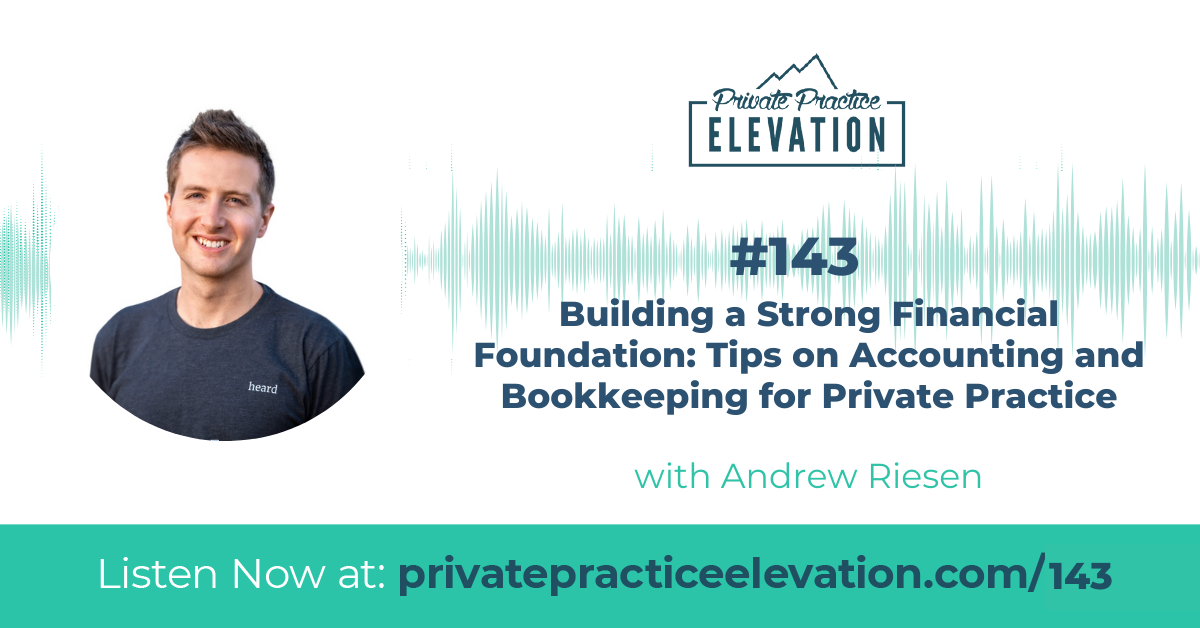In this episode, you’re going to learn about some expert tips on accounting and bookkeeping to help you set up a strong financial foundation for your private practice.
As a private practice owner, you may often focus on the clinical side of your business, providing quality care to your clients and helping them on their journey to wellness. However, it’s crucial not to overlook the financial aspects of running a private practice.
It may not be sexy, but accounting, bookkeeping, and tax management are essential components of a successful business, and neglecting them can lead to unnecessary stress and financial difficulties down the line.
In this episode, I speak with Andrew Riesen, co-founder of Heard, a platform that offers accounting and bookkeeping services for clinicians in private practice.
Andrew shares valuable insights and advice on accounting and tax-related matters that are often overlooked by small business owners. He emphasizes the importance of separating personal and business finances, setting aside money for taxes, and tracking income and expenses.
Andrew also discusses various deductions that clinicians can take advantage of, such as professional development expenses, home office deductions, and retirement contributions.
He highlights the significance of planning for time off and taking care of mental health as a business owner. Andrew also provides an overview of the services offered by Heard, including software, reporting, and access to a team of professionals who can provide guidance and support throughout the year.
In This Episode, You’ll Learn:
- The importance of separating your business accounts from your personal accounts
- How much should you save for taxes?
- Some expenses you maybe didn’t realize you could write off on your taxes
- Lessons I (Daniel) have learned from working with my own accountant
- Some of the accounting nuances therapists think about when setting up a private practice
- Retirement Accounts and why you should be thinking about retirement now
- How to plan for PTO in your business so that you can avoid burnout and feeling guilty about time off
This Episode is Brought To You By
Alma is on a mission to simplify access to high-quality, affordable mental health care by giving providers the tools they need to build thriving in-network private practices. When providers join Alma, they gain access to insurance support, teletherapy software, client referrals, automated billing and scheduling tools, and a vibrant community of clinicians that come together for education, training, and events.
Alma gives clinicians the tools they need to build thriving private practices. When you join their insurance program, you can get credentialed within 45 days, and access enhanced reimbursement rates with major payers. They also handle all of the paperwork, from eligibility checks to claims submissions, and guarantee payment within two weeks of each appointment.
In addition to their insurance program, Alma offers timesaving tools and administrative support — so you can spend less time on paperwork, and more time delivering great care to your clients.
Learn more about building a thriving private practice with Alma at helloalma.com/elevation.
Download the Free Tax Deduction Cheatsheet for Therapists
Links mentioned in this episode:
About Andrew Riesen
Andrew Riesen is a mission-driven entrepreneur, financial accountant, and CEO of Heard, the financial back-office for therapists in private practice. Prior to Heard, Andrew worked at PricewaterhouseCoopers (PWC), where he worked as a financial accountant, helped build an internal software incubator, and co-founded an affordable sales tax solution for small to medium-sized businesses. When not supporting mental health professionals in private practice, Andrew can be found exploring the nooks and crannies of the Pacific Northwest trail-running, cycling, or snowboarding, or at home with his nose in a book or journal.
Key Takeaways: Accounting and Bookkeeping for Private Practice Owners
Separation of Business and Personal Finances
One of the first steps in setting up a successful private practice is establishing a clear separation between your business and personal finances. Andrew Riesen emphasizes the importance of this separation, stating, “Having that separation is going to enable you to have a more clear picture of where your business is at any point in the year.”
To achieve this separation, Riesen recommends setting up a separate business checking account and savings account. By channeling all business-related income and expenses through these accounts, you can easily track your financial transactions and gain a better understanding of your practice’s financial health.
Setting Aside Money for Taxes
Taxes can be a daunting aspect of running a private practice, especially for those who are new to entrepreneurship. Riesen advises private practice owners to set aside money for taxes on a regular basis, stating, “Setting aside money for taxes is crucial to avoid a scary tax liability at the end of the year.”
He suggests setting aside a percentage of your income each month to ensure you have enough funds to cover your tax obligations. While Riesen does not recommend a specific percentage, he highlights the importance of considering your overall financial picture and seeking guidance from a professional to determine the appropriate amount.
Tracking Income and Expenses
Accurate and consistent tracking of income and expenses is vital for maintaining a healthy financial foundation in your private practice. Riesen acknowledges that many clinicians may not be accustomed to tracking their business finances and recommends starting with a simple system, such as a Google Sheet, to record income and expenses.
He advises private practice owners to track all business-related expenses, stating, “If it looks like a business expense, if it smells like one and it feels like one, put it through that business account, put it in your accounting software.” By diligently tracking expenses, you can maximize your deductions and reduce your overall taxable income.
Maximizing Deductions and Write-Offs
When it comes to deductions and write-offs, private practice owners often overlook potential opportunities to reduce their tax liability. Riesen highlights several common expenses that can be deducted, including professional development, travel expenses, home office deductions, health insurance, and retirement contributions.
He encourages private practice owners to take advantage of all eligible deductions. By consulting with a professional and keeping detailed records, you can ensure that you are maximizing your deductions and minimizing your tax burden.
Planning for Retirement and Time Off
As private practice owners, it’s essential to plan for your financial future and prioritize self-care. Riesen emphasizes the importance of setting aside money for retirement and taking time off, stating, “Start contributing a very small amount, even if it’s 1% of your overall profit on a monthly basis. That’s better than nothing.”
He also encourages private practice owners to plan for time off and avoid burnout. By setting aside funds for vacations or personal time, you can ensure that you have the financial resources to take care of yourself and maintain a healthy work-life balance.
Introducing Heard: Simplifying Accounting and Bookkeeping for Private Practice Owners
In the podcast episode, Riesen introduces Heard, a platform designed to streamline accounting and bookkeeping for private practice owners. Heard offers a range of features, including income and expense tracking, reporting, tax guidance, retirement planning, and access to a team of professionals.
Heard aims to address the unique needs of clinicians in private practice and provide cost-effective solutions tailored to their specific requirements. By consolidating financial management tasks into one platform, Heard simplifies the accounting process and allows private practice owners to focus on what they do best – providing quality care to their clients.
Conclusion
Accounting and bookkeeping may not be the most glamorous aspects of running a private practice, but they are crucial for long-term success. By establishing a clear separation between business and personal finances, setting aside money for taxes, tracking income and expenses, maximizing deductions and write-offs, and planning for retirement and time off, private practice owners can build a solid financial foundation.
Platforms like Heard offer valuable tools and resources to simplify accounting and bookkeeping for private practice owners. As the field continues to evolve, it is essential for clinicians to stay informed and seek professional guidance to navigate the complexities of financial management.
By prioritizing financial literacy and taking proactive steps to manage their finances effectively, private practice owners can ensure the long-term sustainability and growth of their businesses. With the right tools and knowledge, clinicians can focus on what they do best – making a positive impact on the lives of their clients.




